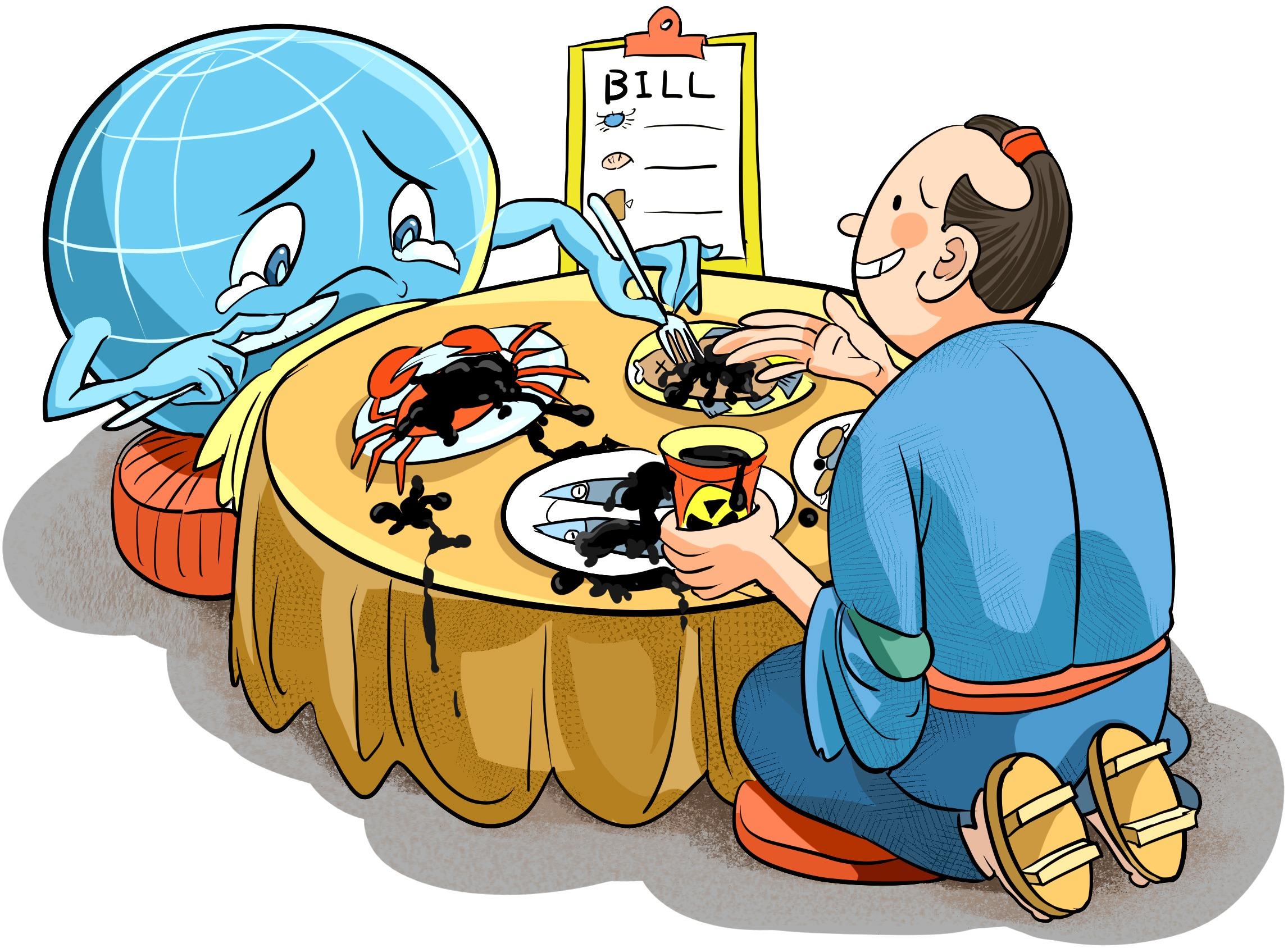 (MA XUEJING / CHINA DAILY)
(MA XUEJING / CHINA DAILY)
Japan began releasing the nuclear-contaminated water from the damaged Fukushima Daiichi Nuclear Power Plant into the Pacific Ocean on Thursday, ignoring the fact that it will cause unpredictable harm to the marine environment and ecology and thus humans.
The Japanese government, with all its so-called evidence, has not been able to convince the international community that the radioactive water is safe to be dumped into the sea. Even the country's fishing industry has consistently protested against the radioactive water discharge plan despite the government's pledge to compensate it for its losses.
In such circumstances, the international society should take measures to ensure Japan bears the legal and moral responsibility for its action, and provides compensation for all the affected parties
Also, many Japanese scientists have expressed their concerns over the long-term effects of the radioactive water on the marine ecosystem and the effectiveness of the Advanced Liquid Processing System in removing all the radionuclides from the water. The radioactive water has more than 60 radionuclides, including tritium, which cannot be effectively treated, and more than 70 percent of the treated water stored in the tanks at the Fukushima facility still has radioactive elements that far exceed the regulatory limits for discharge.
Shigeyoshi Otsuka, a marine geochemist at the University of Tokyo, has said the organically bound form of tritium could contaminate marine organisms, including fish and other seafood. So it is important to evaluate the long-term environmental impact of the radionuclides. And according to a Kyodo survey in July, more than 80 percent of the Japanese public said the government's explanation regarding the release of the treated radioactive water into the sea is "insufficient".
Many countries, too, are against Japan's discharge plan. Although the government of the Republic of Korea recently withdrew its opposition to Japan's water discharge plan for political reasons, more than 85 percent of the ROK public is opposed to the plan, according to a survey released by the Korea Federation for Environmental Movements in May.
Apart from Japan's neighboring countries such as China and the ROK, Southeast Asian, Pacific island and even Latin American countries have also opposed the discharge plan. And although the United States-led West has maintained a studied silence on the issue, obviously for political reasons, many Western scientists and environmental groups are opposed to the plan, saying radionuclides in the water will have a huge negative impact on the marine ecosystem.
The losses for Japan, too, are likely to outweigh the gains of choosing the cheapest way to dispose of the radioactive water, because its international image will suffer a serious blow from which it cannot emerge for years, not to mention the cost its fishing industry will have to pay. According to Japan's Ministry of Agriculture, Forestry and Fisheries, the country's total fish catch, including farm-grown fish, dropped to the lowest since records began in 1956.
More than 10 countries have already restricted the import of food products, including seafood, from Fukushima, with China suspending the import of all aquatic products originating in Japan from Thursday. Also, China's Hong Kong and Macao special administrative regions have banned import of aquatic products from 10 Japanese prefectures. The Chinese mainland and Hong Kong were among top importers of Japan's agricultural products.
Moreover, following Japan's decision to go ahead with its discharge plan, an increasing number of countries and regions are likely to strengthen tests on or ban seafood imports from Japan. The country's tourism, catering and retail industries will also suffer because of the Japanese government's decision, further slowing its economic recovery.
In such circumstances, the international society should take measures to ensure Japan bears the legal and moral responsibility for its action, and provides compensation for all the affected parties. Article 192 of the United Nations Convention on the Law of the Sea stipulates that "states have the obligation to protect and preserve the marine environment". And Article 195 of the UNCLOS requires states to act in a way that they do not transfer "damage or hazards" from one area to another, or transfer "one type of pollution to another".
Despite being a signatory to the UNCLOS, Japan has failed to fulfill these obligations. The case therefore is fit to be presented to the UN General Assembly and the UN Security Council, and referred to the UNLCOS, under Annex VII, for an advisory opinion.
By referring the case to the latter, which is more authoritative and influential, countries can convince the UN General Assembly, the International Maritime Organization and the World Health Organization to move the International Court of Justice against Japan, so it can issue an advisory on Japan's discharge plan. If successful, it will provide strong support for international litigation and arbitration.
Countries can also seek compensation for the damage caused by the radioactive water in accordance with international law. In addition to demanding compensation from Tokyo Electric Power Company, the owner of the damaged Fukushima facility, countries can also seek compensation from the Japanese government in accordance with the UNCLOS and the Convention on the Prevention of Marine Pollution by Dumping of Wastes and Other Matter.
In order to fix the responsibilities of the Japanese government and TEPCO, the international community should establish a supervision mechanism to monitor the discharge and the effects of the radioactive water on the marine ecosystem. And countries along the Pacific Rim should gather evidence and conduct studies to take diplomatic and legal action against Japan for its irresponsible, selfish act.
The author is a specially appointed research fellow in the Department for Asia-Pacific Studies, China Institute of International Studies.
The views do not necessarily reflect those of China Daily.


